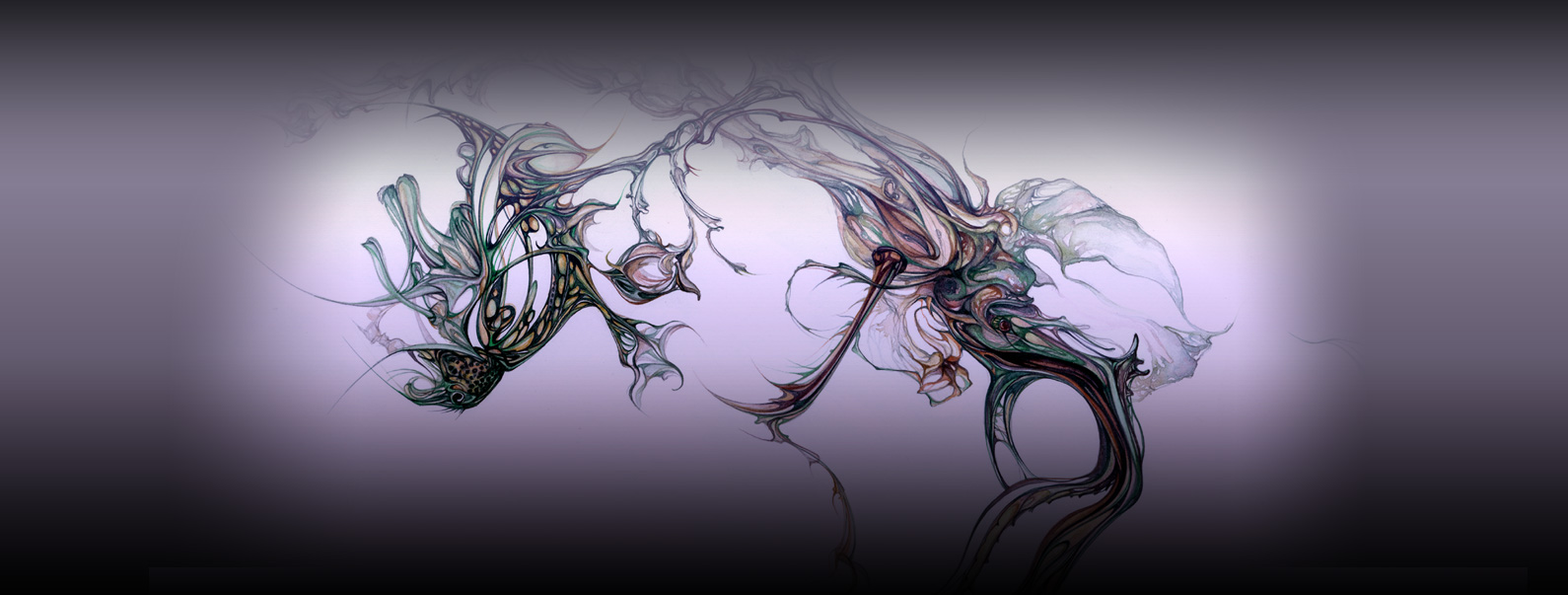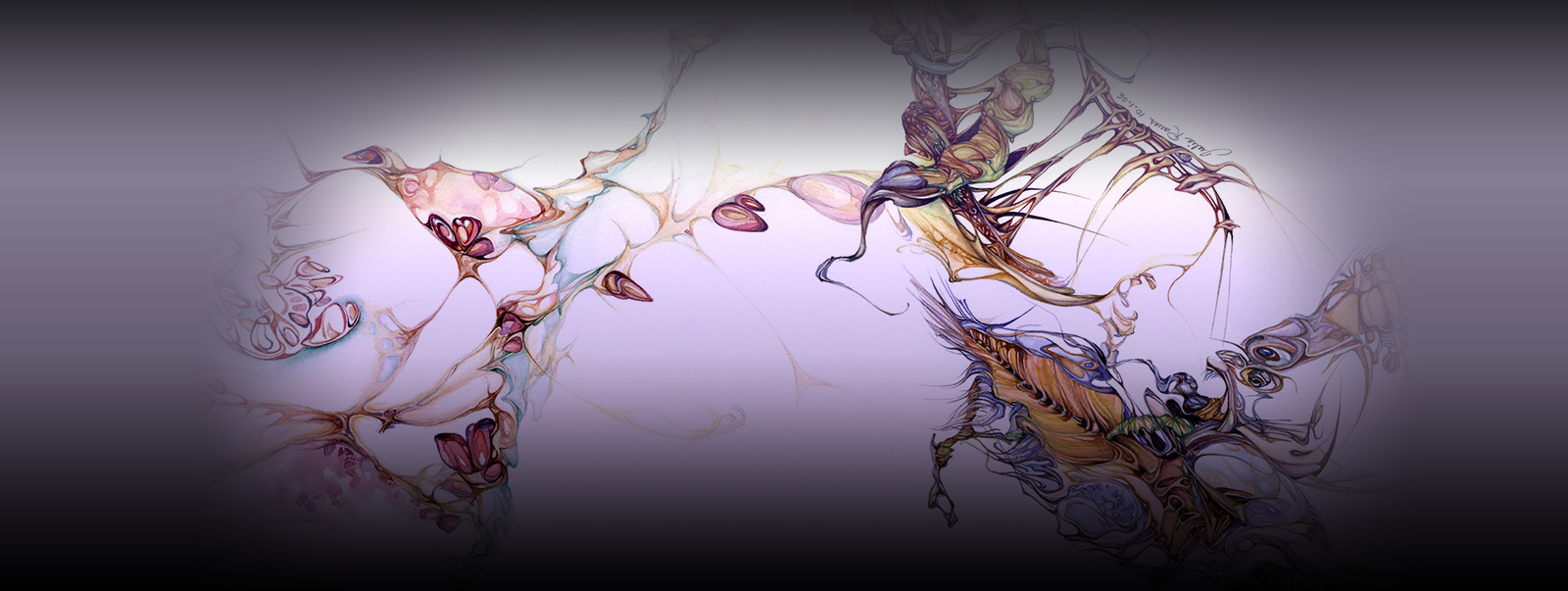A FABLE
Cattails dissected the body of a fisherman who sat within the confines of a small boat sewn to the opalescent skin of a still pond, in the declining hours of the last inhabitable evening before the end of warmth. His skin was vacillating armature, waning shell harboring a superfluous organism, larval defense against distant forces bearing inexorably down, oblivious to the persistent distractions of civilization.
Stalks divided his gaunt frame, tethered to the only fixed point in a kinetic shadowbox, into a procession of flickering columns: sackcloth arms hinged to the drawbridge of a fishing rod, randomly dividing the map of his world into slivers that precluded navigation; strips of muscular air lashing vainly at serrated insect bodies in motion; corrosive shafts of sunlight dissolving the man’s straw hat to expose the strata of history—hair follicles that crawled across his skull in bestial frenzy, unable to form recognizable human patterns on a scalp gorged by rational centuries of mutilating crowns; parasitic mist that slunk from the cave between his chest and pelvis to escape in creeping eyeless ribbons.
Planks of the wooden bow were compromised by decay, holes rapidly filled and evacuated by the stirrings of a man woven from celadon shreds of drowned skin. His feet, hulking barnacles calcified to russet boot leather, had not found land for many cycles, and moved only with his craft, in the grip of water.
Liquid had long since drained from the fisherman’s eyes, which splintered at the corners and bore dry sand along their rims. Lashes detached with each petrified blink and fell into the pond as desperate rods to hook the most inoffensive prey, but the lake would not divulge the pulsing exoskeletons of even the smallest creatures. Declining sight could not discern his own failure, even as the shape of the globe destabilized with the proximity of the approaching threat; his cornea retreated to the solace of stored images, splicing them together again and again to create the illusion of progress.
Squinting under the glare of a primordial sun, oxidizing like a damaged relic, he imagined that with enough heat he could begin again. But roiling fissures slowly opened on the fisherman’s arms, sending a cascade of rusting metal scales to the bottom of the boat, relinquishing his jacket in a shower of elemental corrosion. Half crushed worms rose from the barbed wicker shade of his tackle basket, waving anemone fingers that reached for the common pink of his skin. Lowly bait entered his veins easily and set out on the ephemeral course of sap through trees, a conjoined awareness marked for great descent.
Craving land, the fisherman strained to see through bulrush garrison and west across the pond to his village, but the houses were consistently obscured, promise of comfort replaced by composite heads impaled on crowds of stalks, gasping clusters of brown velvet flowers clinging to emaciated bodies which appeared, across the mitigating expanse of water, as civilization. Far enough to imagine council in the dwellings, affinity in the network of smoking hearths and crowded taverns, loyalty in public chambers and private rooms
Far enough to watch the vortex of ivory spikes rising up from the shore of a gleaming tar pit only to vanish in the tangled green iridescence of jungle, but not close enough to recognize white feather tips emerging from the creased flesh encircling the Green Kingfisher’s black liquid eyes to disappear without warning in verdant feathers. When the bird alighted from its limb overhanging still water to pursue a minnow’s echo, the fisherman clung frantically to its presence, siphoning the broken glass scent of repeated plunges into the deepest regions of the lake, allowing it to drag him down to safest indigo to bind his splintering form. But upon hearing the Kingfisher’s true voice—the elemental buzz of insects—he recoiled with instinctive dread and banished the animal from his thoughts.
Conjuring strains of civilized music, the fisherman momentarily regained the staunch rationality of piano chords infused with high tea porcelain and card table mahogany, starched drawing room elixir that quietly slid down the buttressing shafts of reeds into a net of aquatic roots to die in the last spiraling chamber of a snail shell, fighting for space with a creature devoid of bones.
Rebellious points of color—coral, sepia, apricot, taupe, rose, and ochre—distinct hues coalescing as oil bound flesh stretched over a contemplative jaw, leapt off the surface of the only painting he could remember, to imprint as the fisherman’s sole recollection of his own countenance. Pigments reared up from the linen of Rembrandt’s self portrait, cadmium singular and sculpted, briefly coalescing as an abandoned membrane seated within the confines of a small boat. He could not hold the image, the promise of human achievement, which evaporated, leaving behind a rancid wake of linseed oil, whose odor invaded his nostrils and sunk down to rest amongst shells and lakebed stones. The fisherman wailed as a flayed criminal and opened the cape of his skin to the shoreline.
Tethered still to the rhythms of his own language, the man struggled to assemble words as his mind relinquished dialect to the rural hum of phonetic absence: cold strings of a new moon vibrating against the stir of deep space; accordion gills expelling deep forest air from wild mushroom colonies; oak leaves drawn as tidal gravestones across the backs of Death Watch beetles crawling through shifting catacombs beneath; indentured march of leafcutter ants anchored to their jagged green sails.
Human noise coalesced as viscous futility, a wet stain quickly absorbed by rows of plant cell walls as they rotated en masse towards the sun. Anthropoid refinement banished by glare, the fisherman turned in his boat with the rasping groan of a crude mechanism, a collection of wet organs, cold strings of a waning form rocking against the hollows of deep water. Over the sucking wood, he could hear the approaching drone of a single mosquito intent on his blood.
When the piercing tube broke through his skin and descended into the gauze of his vessel, the mosquito emptied herself in corrosive saliva to digest the man. She endured inside him and took the substance from his blood until he could no longer justify his mass, nor hold the clot of his form. Only the insect remained and her eggs covered the skin of the pond.
Hundreds of bodies hung upside down just below the oily husk of a motionless swamp, each mosquito larva shooting two minute air tubes up above the water line to vigorously breath in the ruin of coming days.
Copyright © August 24, 2004 – Julie Rauer





COMMENTS
There are no comments yet!